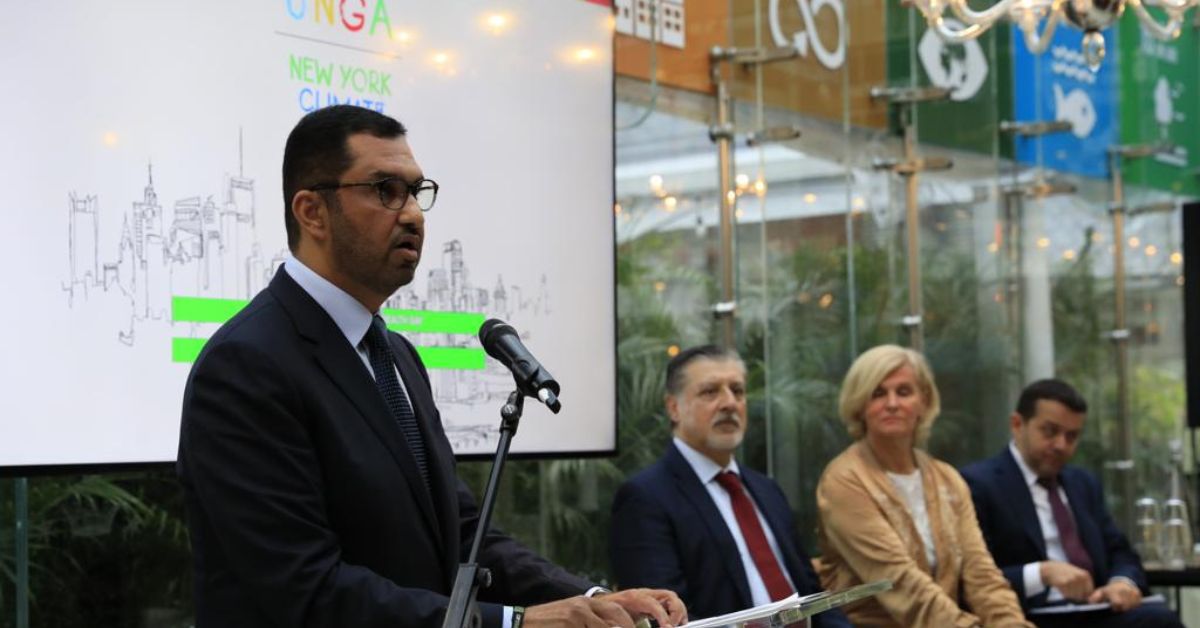NEW YORK — The COP28 will drive international action on climate and health, marking the first-ever Health Day and climate-health ministerial at a COP. This presents a groundbreaking opportunity to outline steps toward equitable, climate-resilient health systems and mobilize essential investment in the sector, said Dr. Sultan bin Ahmed Al Jaber, the UAE’s Minister of Industry and Advanced Technology and COP28 President-Designate.
Speaking during the United Nations General Assembly and New York Climate Week, alongside Dr. Tedros Ghebreyesus, Director-General of the World Health Organization (WHO), and Dr. Lazarus McCarthy Chakwera, President of Malawi, Dr. Al Jaber urged the international community to support the day and ministerial, co-hosted with the WHO and several countries.
Dr. Al Jaber emphasized the vital link between climate change and health, stating, “The connection between health and climate change is clear, but it hasn’t been a specific focus of the COP process — until now. This must change.”
“As we gear up for the pivotal Health Day at COP28, we’re committed to addressing the health challenges posed by climate change and promoting significant investment in the health sector. Our aim is to foster resilient, equitable health systems that can withstand climate change impacts,” he added.
He thanked country champions, including Brazil, the UK, the US, the Netherlands, Kenya, Fiji, India, Egypt, Sierra Leone, and Germany, for spearheading the climate health discussions at COP28.
Dr. Al Jaber pointed out the health risks posed by climate change, such as shifting disease patterns and the resurgence of previously contained diseases. He cited WHO statistics showing that air pollution causes seven million excess deaths annually. Diseases like Malaria are expanding due to rising temperatures, disproportionately affecting vulnerable populations.
The COP28 Health Day on December 3rd will also address the fragility of global health systems, as revealed by the COVID-19 pandemic, and the pressing need for transformative changes in response to climate change.
“COP28 aims to spotlight these issues, uniting partners who can effect positive change. We’re determined to reverse these trends with an inclusive action agenda centered on a just transition, equitable climate finance, and improved lives and livelihoods,” Dr. Al Jaber remarked.
Finance will be a focal point during COP28’s Health Day. The financial impact of health crises due to climate change could reach between US$2-4 billion annually by 2030, intensifying poverty, especially in disadvantaged areas. The World Bank estimates that nearly 40% of climate-related poverty will stem from the direct health impacts of climate change.
Dr. Al Jaber advocated for increased concessional funds to the Global South and emphasized rebalancing finance. He urged governments to double adaptation finance by 2025 and generously contribute to the Green Climate Fund.
He also highlighted the importance of viewing health investments as assets rather than costs. According to the World Bank, every dollar invested in climate resilience yields an average four-dollar benefit.
He urged financial institutions, including development banks, to prioritize climate-health investments and praised organizations like the World Bank, the Asian Development Bank, the Green Climate Fund, and the Rockefeller Foundation for their commitment to bridging the climate-health financing gap at COP28.
Dr. Al Jaber spotlighted the UAE’s legacy in safeguarding human health, emphasizing the commitment of the late Sheikh Zayed bin Sultan and President His Highness Sheikh Mohamed bin Zayed Al Nahyan to prioritize people’s lives and livelihoods. He mentioned initiatives like “Reaching the Last Mile,” which has committed over US$455 million to enhance global health outcomes, focusing on resilient health systems for vulnerable communities.
The UN event, “Looking Forward Towards COP’s First-Ever Day of Health: Advancing A Bold Vision for Action, Equity, and Accountability,” featured figures including Adnan Amin, CEO of COP28, and Dr. Maria Neira, Director of the Department of Environment, Climate Change, and Health at the WHO. Vanessa Kerry, WHO’s Special Envoy on Climate Change and Health, moderated the session.
The COP28 Presidency’s Action Agenda offers a science-based, action-driven plan to address the climate crisis, blending passion with pragmatism.
Health is a central part of the Agenda, which also introduces a Food Declaration to drive positive changes in systems, enhance food security, and advocate sustainable agricultural practices. COP28 will also debut the first-ever climate-Health Ministerial Declaration and a significant mobilization of nature-climate finance.
Other focus areas include accelerating the energy transition, rectifying climate finance, and ensuring an inclusive COP28.







